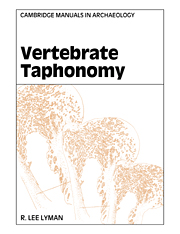Book contents
- Frontmatter
- Dedication
- Contents
- List of figures
- List of tables
- Preface
- Acknowledgements
- 1 WHAT IS TAPHONOMY?
- 2 THE HISTORY AND STRUCTURE OF TAPHONOMY
- 3 TAPHONOMY IN PRACTICE AND THEORY
- 4 STRUCTURE AND QUANTIFICATION OF VERTEBRATE SKELETONS
- 5 VERTEBRATE MORTALITY, SKELETONIZATION, DISARTICULATION, AND SCATTERING
- 6 ACCUMULATION AND DISPERSAL OF VERTEBRATE REMAINS
- 7 FREQUENCIES OF SKELETAL PARTS
- 8 BUTCHERING, BONE FRACTURING, AND BONE TOOLS
- 9 OTHER BIOSTRATINOMIC FACTORS
- 10 BURIAL AS A TAPHONOMIC PROCESS
- 11 DIAGENESIS
- 12 TAPHONOMY OF FISH, BIRDS, REPTILES, AND AMPHIBIANS
- 13 DISCUSSION AND CONCLUSIONS
- Bibliography
- Glossary of taphonomy terminology
- Index
2 - THE HISTORY AND STRUCTURE OF TAPHONOMY
Published online by Cambridge University Press: 05 August 2014
- Frontmatter
- Dedication
- Contents
- List of figures
- List of tables
- Preface
- Acknowledgements
- 1 WHAT IS TAPHONOMY?
- 2 THE HISTORY AND STRUCTURE OF TAPHONOMY
- 3 TAPHONOMY IN PRACTICE AND THEORY
- 4 STRUCTURE AND QUANTIFICATION OF VERTEBRATE SKELETONS
- 5 VERTEBRATE MORTALITY, SKELETONIZATION, DISARTICULATION, AND SCATTERING
- 6 ACCUMULATION AND DISPERSAL OF VERTEBRATE REMAINS
- 7 FREQUENCIES OF SKELETAL PARTS
- 8 BUTCHERING, BONE FRACTURING, AND BONE TOOLS
- 9 OTHER BIOSTRATINOMIC FACTORS
- 10 BURIAL AS A TAPHONOMIC PROCESS
- 11 DIAGENESIS
- 12 TAPHONOMY OF FISH, BIRDS, REPTILES, AND AMPHIBIANS
- 13 DISCUSSION AND CONCLUSIONS
- Bibliography
- Glossary of taphonomy terminology
- Index
Summary
Taphonomy is now in its salad days.
(P. Dodson 1980:8)A brief history of taphonomic research
One hallmark of a scientific discipline's maturity is the publication of a history of it. Several brief histories have been written about taphonomy (Cadée 1990; Dodson 1980; Olson 1980). Although informative, these have been largely limited to the relation of taphonomy to paleontology. Perhaps because taphonomy developed first in paleontology, which has as its focus the study of biological evolution and paleoecology, when archaeologists borrowed the concept they also borrowed the connotation that the fossil record is probably biased. That is, information on the ecology and morphology of animals is lost or altered between the time of an organism's death and the time its remains are recovered and studied (Dodson 1980; Lawrence 1968, 1971). North American paleobiologists initially adopted Efremov's version of taphonomy — that the fossil record is incomplete and therefore biased — rather than the German version which focused on reconstruction of past environments via detailed paleobiological analysis (Cadée 1990:9—13). It is not surprising, then, that North American zooarchaeologists see the zooarchaeological record as biased. Paleobiologists today often worry about the “fidelity” (Kidwell and Bosence 1991) and completeness (e.g., McKinney 1990) of the fossil record; lack of either denotes a biased fossil record with regard to how accurately paleobiotas are reflected. But because bias is relative, not all assemblages of animal remains are biased in all ways.
- Type
- Chapter
- Information
- Vertebrate Taphonomy , pp. 12 - 40Publisher: Cambridge University PressPrint publication year: 1994

